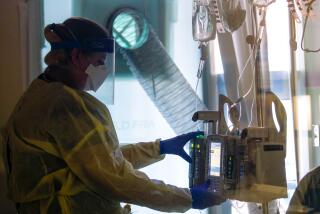Early Cesarean deliveries pose risk for babies, study finds
- Share via
Thousands of women put their babies at needless risk of respiratory problems, hypoglycemia and other medical ailments by scheduling cesarean deliveries too early, according to an analysis of more than 13,000 births published today in the New England Journal of Medicine.
Elective cesarean sections performed after 37 or 38 weeks of pregnancy had up to four times the risk of serious complications compared with procedures done after 39 weeks. Even deliveries that were just one, two or three days shy of 39 weeks carried a 21% increased risk of complications, the study found.
“It looks like a day or two makes a difference,” said Dr. John Thorp, a professor of obstetrics and gynecology at the University of North Carolina at Chapel Hill and coauthor of the study.
The initiation of labor is a baby’s way of signaling that it is ready to live outside the womb, Thorp said. When doctors schedule elective C-sections, “we’re saying we’re smarter than that signal,” he said. “There are some babies who aren’t ready to make that transition and are forced to do so.”
Altogether, there were 1,262 cases involving some kind of complication among the 13,258 elective C-sections examined in the study. The incidence of adverse outcomes was 15.3% after 37 weeks, 11% after 38 weeks and 8% after 39 weeks.
The American College of Obstetrics and Gynecology has recommended since at least 1999 that patients wait 39 weeks or longer before having an elective C-section, said Dr. Mary D’Alton, chair of the Department of Obstetrics and Gynecology at New York-Presbyterian Hospital/Columbia University Medical Center. D’Alton, who wasn’t involved with the study, led an expert panel for the National Institutes of Health in 2006 that also emphasized in a report the importance of scheduling voluntary C-sections after 39 weeks of pregnancy.
Yet more than one-third of the women in the study published Wednesday delivered earlier than that -- 6% after 37 weeks and 30% after 38 weeks.
Those mothers were more likely to be Caucasian, married and privately insured, the study found -- part of a cohort of professional women sometimes described as “too posh to push.” They probably scheduled their deliveries on the early side to avoid any risk of going into labor at a time when their doctors might not be available to care for them, Dr. Michael F. Greene, the chief of obstetrics at Massachusetts General Hospital in Boston, wrote in an editorial accompanying the study.
The analysis was based on data collected by 19 academic medical centers for the National Institute of Child Health and Human Development, part of the NIH.
Researchers identified women who delivered singleton babies by C-section between 1999 and 2002, even though they had no medical reason for doing so.
Compared with babies born after 39 weeks, babies delivered after 37 weeks were 4.2 times more likely to suffer from respiratory distress syndrome (3.7% of births versus 0.9%) and about three times more likely to be treated for hypoglycemia (2.4% versus 0.7%) or newborn sepsis (7% versus 2.5%).
They also had more than double the risk of being admitted to a neonatal intensive care unit and were almost three times as likely to require more than five days of hospitalization.
Babies born after 38 weeks had twice the risk of respiratory distress syndrome compared with those born after 39 weeks and were 30% to 80% more likely to have other serious complications, the study found.
The results suggest that the seven days during the 40th week of pregnancy is the safest time to schedule an elective C-section, Thorp said. That window is “smaller and more tightly bound” than previously thought, he said.
Many patients should be able to shift their deliveries into that window without too much trouble, D’Alton said. In the study, 52% of the early deliveries occurred in the last three days before reaching the 39-week threshold.
The researchers also found that the risks rose again after 40 weeks of pregnancy, said Dr. Alan Tita, an obstetrician at the University of Alabama at Birmingham who led the study.
“We were surprised,” Tita said. “However, very few planning an elective cesarean would wait beyond 39 to 40 weeks.”
--





